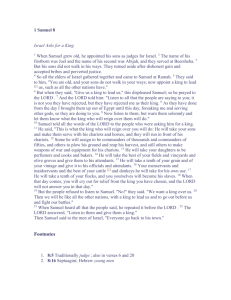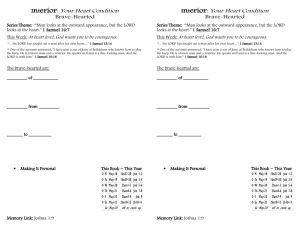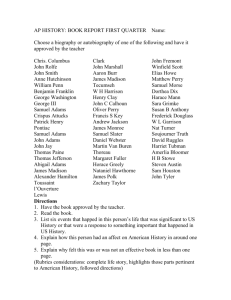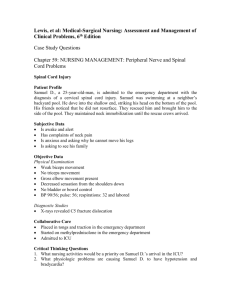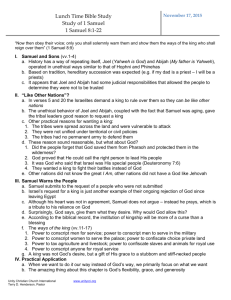The Second Sunday after Pentecost, June 10, 2012
advertisement
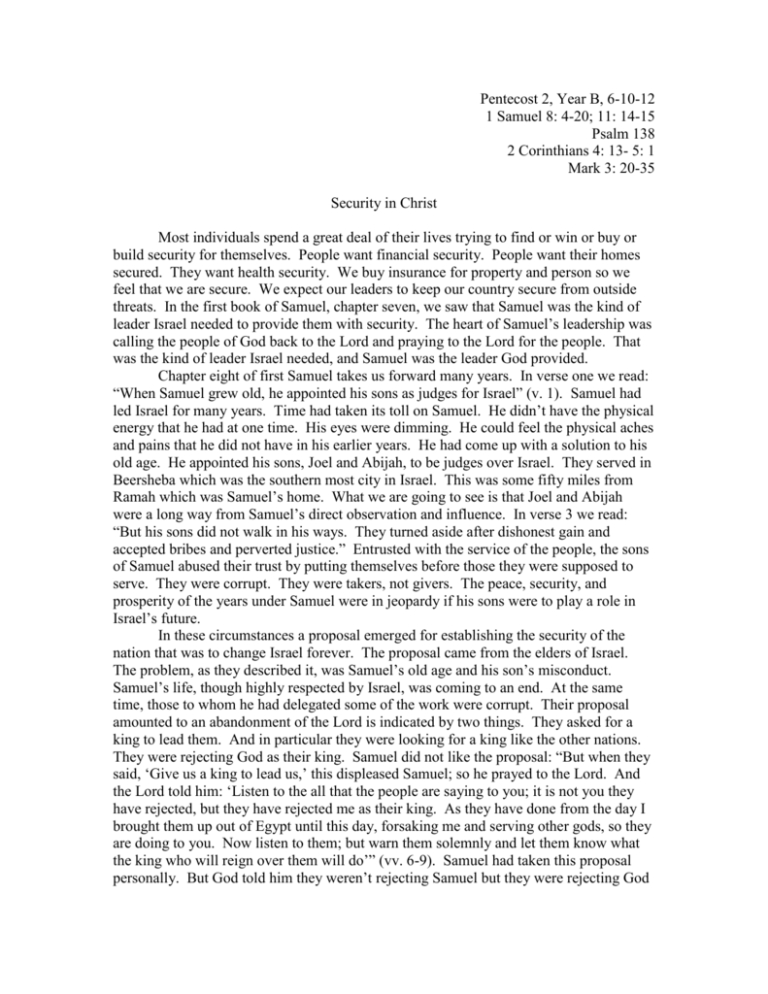
Pentecost 2, Year B, 6-10-12 1 Samuel 8: 4-20; 11: 14-15 Psalm 138 2 Corinthians 4: 13- 5: 1 Mark 3: 20-35 Security in Christ Most individuals spend a great deal of their lives trying to find or win or buy or build security for themselves. People want financial security. People want their homes secured. They want health security. We buy insurance for property and person so we feel that we are secure. We expect our leaders to keep our country secure from outside threats. In the first book of Samuel, chapter seven, we saw that Samuel was the kind of leader Israel needed to provide them with security. The heart of Samuel’s leadership was calling the people of God back to the Lord and praying to the Lord for the people. That was the kind of leader Israel needed, and Samuel was the leader God provided. Chapter eight of first Samuel takes us forward many years. In verse one we read: “When Samuel grew old, he appointed his sons as judges for Israel” (v. 1). Samuel had led Israel for many years. Time had taken its toll on Samuel. He didn’t have the physical energy that he had at one time. His eyes were dimming. He could feel the physical aches and pains that he did not have in his earlier years. He had come up with a solution to his old age. He appointed his sons, Joel and Abijah, to be judges over Israel. They served in Beersheba which was the southern most city in Israel. This was some fifty miles from Ramah which was Samuel’s home. What we are going to see is that Joel and Abijah were a long way from Samuel’s direct observation and influence. In verse 3 we read: “But his sons did not walk in his ways. They turned aside after dishonest gain and accepted bribes and perverted justice.” Entrusted with the service of the people, the sons of Samuel abused their trust by putting themselves before those they were supposed to serve. They were corrupt. They were takers, not givers. The peace, security, and prosperity of the years under Samuel were in jeopardy if his sons were to play a role in Israel’s future. In these circumstances a proposal emerged for establishing the security of the nation that was to change Israel forever. The proposal came from the elders of Israel. The problem, as they described it, was Samuel’s old age and his son’s misconduct. Samuel’s life, though highly respected by Israel, was coming to an end. At the same time, those to whom he had delegated some of the work were corrupt. Their proposal amounted to an abandonment of the Lord is indicated by two things. They asked for a king to lead them. And in particular they were looking for a king like the other nations. They were rejecting God as their king. Samuel did not like the proposal: “But when they said, ‘Give us a king to lead us,’ this displeased Samuel; so he prayed to the Lord. And the Lord told him: ‘Listen to the all that the people are saying to you; it is not you they have rejected, but they have rejected me as their king. As they have done from the day I brought them up out of Egypt until this day, forsaking me and serving other gods, so they are doing to you. Now listen to them; but warn them solemnly and let them know what the king who will reign over them will do’” (vv. 6-9). Samuel had taken this proposal personally. But God told him they weren’t rejecting Samuel but they were rejecting God as their king. God told Samuel to listen to them and warn them, an ominous note, what the new king would do. So Samuel spoke all the words of the Lord to the elders who were asking for a king. He said, “This is what the king who will reign over you will do: He will take your sons and make them serve with his chariots and horses, and they will run in from of his chariots. Some he will assign to be commanders of thousands and commanders of fifties, and others to plow his ground and reap his harvest, and still others to make weapons of war and equipment for his chariots. He will take your daughter to be perfumers and cooks and bakers. He will take the best of your fields and vineyards and olive groves and give them to his attendants. He will take a tenth of your grain and of your vintage and give it to his officials and attendants. Your menservants and maidservants and the best of your cattle and donkeys he will take for his own use. He will take a tenth of your flocks, and you yourselves will become his slaves. When that day comes, you will cry out for relief from the king you have chosen, and the Lord will not answer you in that day” (vv. 11-18). Sons will be drafted into military service; he will take their daughters; he will take the best of their fields; he will take a tenth of their produce; he will take their servants and livestock; he will take a tenth of their flocks, and they will be slaves. The warning fell on deaf ears: “But the people refused to listen to Samuel. ‘No!’ they said. ‘We want a king over us. Then we will be like all the other nations, with a king to lead us and to go out before us and fight our battles’” (vv. 19-20). God acquiesced to their demands and gave them a king. Of the 43 kings who reigned in Israel only eight are given a favorable light. Saul started well but finished an abject failure. David was a great king but hand an affair with Bathsheba and had her husband killed in battle. Solomon was a great king who was known for his wisdom and built the temple. But he also married many foreign women and allowed them to bring their pagan religion to Israel. All the kings had their shortcomings. None were perfect. But God had promised Israel that he would send them the Messiah-king who would reign in justice and righteousness. In the book of Isaiah we read: “For to us a child born, to us a son is given, and the government will be on his shoulders. And he will be called Wonderful Counselor, Mighty God, Everlasting Father, Prince of Peace. Of the increase of his government and peace there will be no end. He will reign on David’s throne and over his kingdom, establishing and upholding it with justice and righteousness from that time on and forever” (Is. 9:6-7). On the first Good Friday, Jesus stood before the great pagan political leader of that day – Pontius Pilate. Pilate put a question to Jesus, “Are you the king of the Jews?” Jesus reply was, “My kingdom is not of this world, If my kingdom were of this world, my servants would have been fighting, that I might not be delivered over to the Jews. But my kingdom is not from this world” (Jn 18:36). Jesus was not a king like all the other nations. Jesus is a king who does not take but gives. We read about King Jesus in the book of Philippians: “And being found in appearance as a man, he humbled himself and became obedient to death – even death on a cross! Therefore God exalted him to the highest place and gave him the name that is above every name, that at the name of Jesus every knee should bow, in heaven and on earth and under the earth, and every tongue confess that Jesus Christ is Lord, to the glory of God the Father” (Phil. 2:8-11). It is through the death and resurrection of Jesus that we find our ultimate and eternal security.
